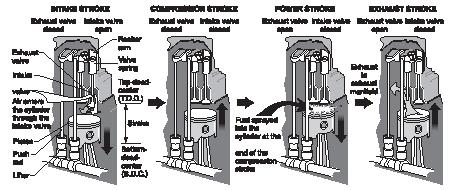Diesel engine
A diesel engine is a type of internal-combustion engine developed by German engineer Rudolf Diesel (1858–1913) in the late nineteenth century. His original design called for the use of coal dust as fuel, but most modern diesel engines burn low-cost fuel oil. Whereas gasoline engines (found in the majority of present-day automobiles) use an electric spark to ignite the premixed fuel-air blend, diesel engines use compressed air to ignite the fuel.
In both gasoline and diesel engines, fuel is ignited in a cylinder, or chamber. Inside the sealed, hollow cylinder is a piston (a solid cylinder) that is attached at the bottom to a crankshaft. The movement of the piston up and down turns the crankshaft, which transfers that movement through various gears to the drive wheels in an automobile.
In a diesel engine cylinder, the piston completes one up-and-down cycle in four strokes: intake, compression, power, and exhaust. During the intake stroke, the piston moves downward, sucking air into the cylinder through an open intake valve. On the compression stroke, the intake valve closes and the piston rises, compressing the air in the cylinder and causing it to become heated. While the air is being compressed, a fuel pump sprays fuel into the cylinder to mix with the air. When the compressed, hot air reaches the right temperature, it ignites the fuel, driving the piston down on the power stroke. As the piston rises on the exhaust stroke, the exhaust valve opens and the gases created by explosion of the fuel (exhaust) pass out of the cylinder. Then the cycle repeats.
The entire combustion cycle takes but a fraction of a second. Diesel engines can operate from several hundred up to almost one thousand revolutions per minute. The high pressure created in the cylinders during compression requires diesel engines to be strongly constructed and, thus, much heavier than gasoline engines. This weight cuts into their fuel efficiency. Diesel engines also emit high levels of foul-smelling exhaust.
However, diesel engines are more powerful than conventional gasoline engines and run on a less costly fuel. First installed on a ship in 1910 and in an automobile in 1922, they are generally used in large vehicles such as locomotives, trucks, and buses, and in heavy construction and agricultural machinery. Because of their ability to burn crude fuels while delivering an efficient amount of the fuel's energy as usable power, diesel engines are almost the only choice for industrial power throughout the world.
[ See also Internal-combustion engine ]
